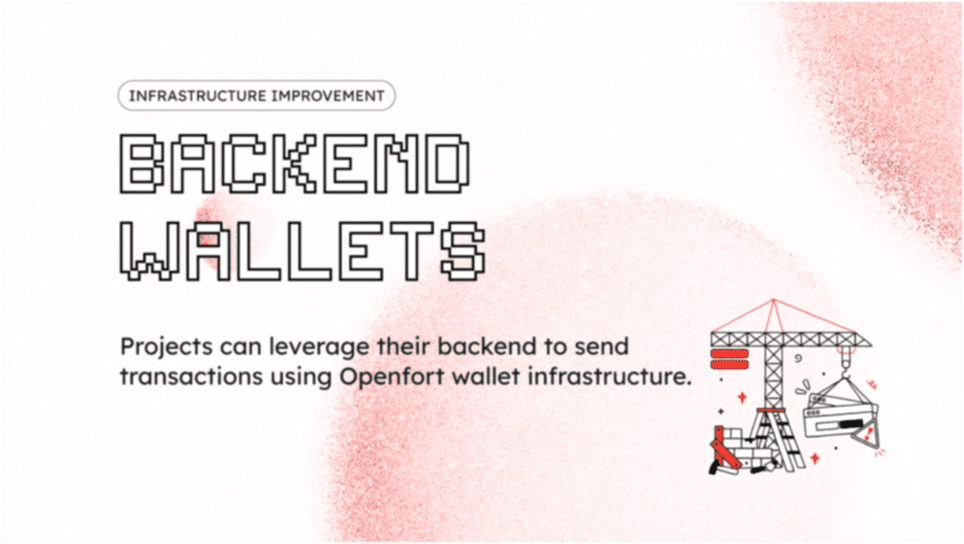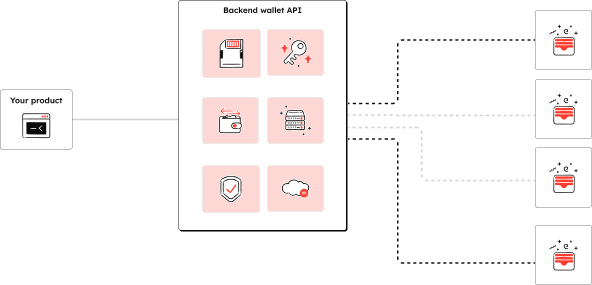
Automating blockchain transactions, managing digital assets programmatically, and crafting seamless user experiences require robust infrastructure. At Openfort, we’ve built backend wallets to empower developers to execute on-chain actions at scale while maintaining security, flexibility, and enterprise-grade performance. Let’s explore how they work and why they matter.
What are backend wallets?
Backend wallets are developer-controlled accounts that run on your server, enabling automated blockchain interactions without manual user input. Unlike traditional user wallets, they:
- Operate programmatically via APIs.
- Support gasless transactions via ERC-2771 forwarders or ERC-4337 paymasters.
- Manage assets at scale for use cases like treasury systems, NFT drops, or cross-chain operations.
Why Openfort’s backend wallets?
Our infrastructure combines EOA flexibility and ERC-4337 smart account capabilities to address critical Web3 challenges:
- Automated Transactions: Execute batch mints, disbursements, or trades without user signatures.
- Gas Abstraction: Sponsor gas fees via custom forwarders or Openfort’s paymaster.
- Enterprise Security: Custodial wallets with Google Cloud TEE-based key management.
- EVM Compatibility: Seamlessly deploy on Ethereum, Polygon, Base, and other EVM chains.

Key features & architecture
Secure key management
- Google Cloud TEE backend: Private keys are secured in Trusted Execution Environments (TEEs), ensuring cryptographic operations remain isolated from external threats.
- Custody flexibility: Choose between custodial EOAs (ideal for treasury management) or non-custodial options with verified ownership.
Cross-chain scalability
While currently focused on EVM chains (Ethereum, Polygon, Base), Openfort’s infrastructure is designed for future expansion to non-EVM networks like Solana and Bitcoin.
Policy engine & transaction controls
- Granular rules: Enforce allowlists, transaction limits, or contract-specific interactions.
- Idempotent execution: Prevent duplicate transactions with built-in deduplication.
- State sync: Monitor transaction statuses in real time via webhooks or Websockets.
High performance infrastructure
- Below 300ms signature times: Optimized cryptographic libraries ensure low-latency operations.
- Four 9s uptime: Globally distributed nodes guarantee reliability for mission-critical applications.
Key use cases
1. Treasury management
- Automate payroll in stablecoins.
- Manage protocol-owned liquidity pools.
- Distribute rewards or refunds programmatically.
2. NFT operations at scale
- Batch-mint NFTs for gaming items or collectibles.
- Update dynamic metadata (e.g., evolving in-game assets).
- Airdrop assets to user wallets post-purchase.
3. Shared & automated wallets
- Collaborative Control: Configure multi-party approval (m-of-n) for DAO treasuries or institutional wallets.
- AI-Driven Agents: Program wallets to execute stop-loss trades, recurring payments, or DeFi strategies.
4. Cross-Border Payment Systems
- Manage millions of wallets for users or machines.
- Automate stablecoin disbursements with gas sponsorship.
Getting started in 3 steps
1. Create a backend wallet
Via Dashboard:
- Navigate to Backend Wallets.
- Click Add Account and name your wallet (e.g., “Minting Account”).

Via API:
_10const Openfort = require('@openfort/openfort-node').default; _10const openfort = new Openfort(process.env.OPENFORT_SECRET_KEY!); _10_10// Create custodial EOA _10const account = await openfort.settings.createDeveloperAccount({ _10 name: 'Escrow Account', _10});
2. Configure gas policies
-
For EOA wallets:
- Deposit native tokens for gas.
- Use Openfort’s default ERC-2771 forwarder or deploy your own.
-
For smart wallets:
- Set paymaster rules (e.g., sponsor gas for specific users).
3. Execute transactions
_10// Gasless NFT mint using a forwarder _10const tx = await openfort.transactions.create({ _10 chainId: 80001, // Polygon Mumbai _10 account: account.id, _10 to: NFT_CONTRACT_ADDRESS, _10 data: mintCalldata, _10 policy: "GASLESS_FORWARDER" _10});
Advanced capabilities
Automated Gas Sponsorship
- Never manually top up wallets. Use Openfort’s paymaster to dynamically fund transactions.
- Define policies to sponsor gas for specific users, contracts, or transaction types.
Flexible custody models
- Custodial EOAs: Retain full control for internal operations (e.g., treasury accounts).
- Non-Custodial Options: Verify ownership via signed messages for user-assigned wallets.
Multi-chain event listeners
- Register webhooks to track onchain events (e.g., incoming payments, contract interactions).
- Sync wallet states across frontend and backend systems in real time.
Why developers choose Openfort
- Unified APIs: Manage EOA and ERC-4337 wallets with one SDK.
- Zero Infrastructure Overhead: No need to self-host relayers or signers.
- Multi-Chain Ready: Currently EVM-focused, with seamless chain switching.